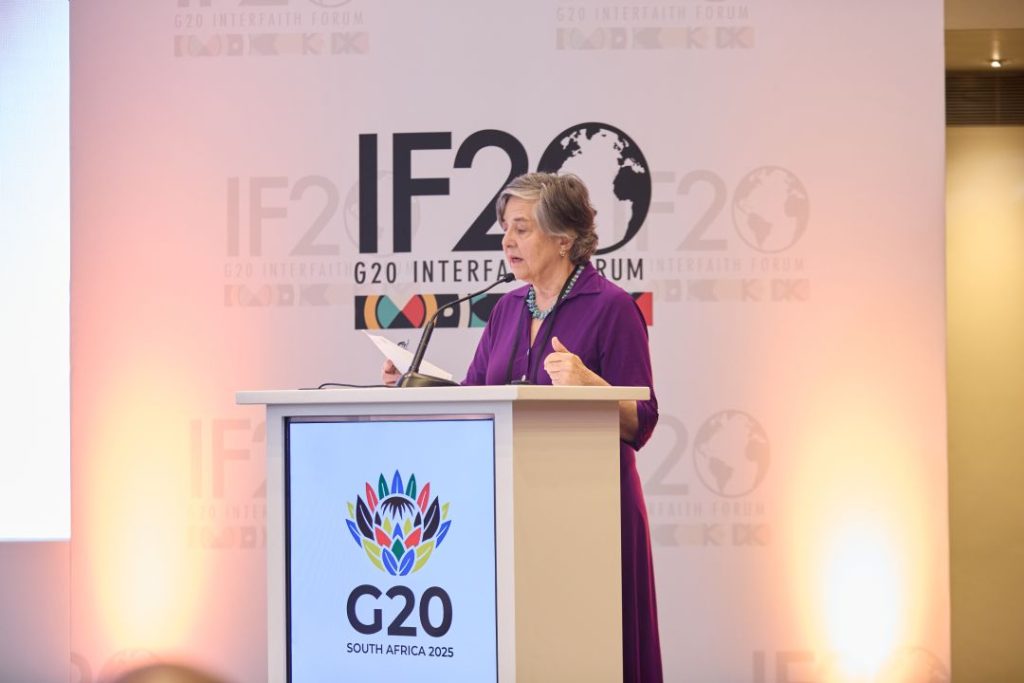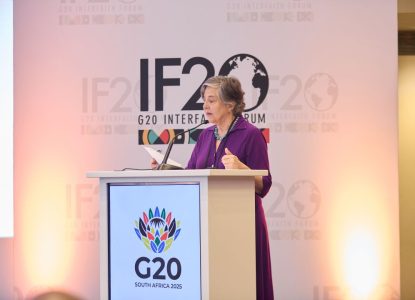By Katherine Marshall, G20 Interfaith Forum Vice President
– – –
Marshall provided these comments to officially close the 2025 G20 Interfaith Forum meetings in Cape Town, South Africa in August, 2025. Watch the video of her address here.
Professor Mosoma, when you started us off at the beginning of the Forum on Monday, you began by reminding us to take a moment to remember the people who are suffering in the world, to remember the violence that’s taking place, the hunger, the people who don’t have opportunities. And I think that throughout this event, this call and this reminder has remained on our minds. Many of us hear echo after echo of the words we’ve heard over the past days. One that still resonates for me is hearing that “we’re in an angry nation.” I think we’re also in an angry nation in the United States, as well, and in other parts of the world. And it is our privilege, but also our duty and our responsibility, to remember what we have heard. We also come away inspired by the spirit and hope of the ideals of Ubuntu and the work that you, and we, all do that brings us together.
We’ve heard so much here that is inspirational about Ubuntu and the spirit of Ubuntu. But I remember also Ebrahim Rasool’s reminder: that there’s a hard edge to Ubuntu, which is that “I am my brother’s keeper, that we have the responsibility to act so, with words and ideas and experience, with prophetic voices that call us to action, demand action, for peace, for caring, for compassion.” I think we all leave this Forum with a powerful sense of what we can do and what we must do together.

Advancing Together
I started out on Monday talking about something that echoes in my mind always: a young leader’s quip about a conference – “NATO: no action, talk only.” Through these days, I have been echoing or thinking of alternatives that convey our true spirit, which is decidedly not NATO. I came up with some other acronyms, words constituting “brave” and “grace.” I will mention another here: ADVANCE, because it brings together some words that I think reflect our discussions.
- So A is for accountability, as we heard time and time again, that we have and we need to build practical mechanisms for accountability.
- I think we heard a lot about D: determination, and commitment to action.
- V stands in for the idea that we are inspired and directed by a vision, by a prophetic voice.
- A is for action and the courage, moral and physical, to act.
- N is for now, which symbolizes urgency but also that we are living another Kairos moment, a moment when we can be transformational, reflecting the wisdom in the idea that in crisis there is both danger and opportunity.
- C calls us to compassion, with grace and spirit.
- And the final E exemplifies empowerment and the inspiration it calls out.
There are many other words and ideas, but those in ADVANCE represent some of the thoughts that echo as we move away from talk and the need for dialogue and learning from each other to action.
Curtain Call
I’ll end with the important need for appreciation and thanks, inspired by the idea of the theater, where what happens at the end is that one by one, the cast comes out and takes a bow. We can’t do that here for the full cast, but let’s imagine everyone who should take a bow and be applauded.
Start with the sound technicians, the people who’ve served us food, the people who’ve arranged our hotels: they all need to come out.
Each one of you who’s participated in any of these plenaries and panels, who’s contributed your challenges, experience and ideas, who’ve written blogs, and posted on social media. Thank you to all of you.
Thank you so much also to our colleagues in the G20 Interfaith family. It is a family of people who are engaged in the process, almost all volunteers, as almost everyone who is doing this work does it because of caring and passion. They volunteer hours and hours of time, many Zoom calls, many hours on planes. To the large team from Utah, I’d add the team from Georgetown University, the foundations that have helped us over the years, and had patience with us, and other partners.
I think that the greatest, the final call of this cast as they come to the stage, is the local organizing committee, our friends, as Whitney has highlighted, who have put in so much effort and made this event a truly South African event, where we have learned about South Africa, from South Africa’s challenges and its dogged determination and spirit of inclusion, of Ubuntu. Thank you and congratulations!
We’re reminded of the miracle of South Africa’s transition, which is very much a centerpiece of my own professional life and experience. 1994 was a great year, a year dominated by Nelson Mandela, who remains, I think, one of the greatest inspirations among all world leaders, ever. Mandela is our model, our example, our inspiration. But there are so many others, men and women, young and old, who inspire us. So special thanks to all of you, South African brothers and sisters. I won’t name people, I won’t go into that, because we don’t have time and the planes are waiting.
But I wanted to end with our sense of deep appreciation, for the learning, for the fellowship, for the caring, for the passion, for the disagreements about how we should handle what we should do. And with our firm, collective commitment, our solidarity, that we will be taking our issues, our five issues, but also the others that people care about so deeply, forward in every way that our imagination, our energy, our creativity, our intelligence, and our spirit allows. Because we care, and we believe so deeply that the voices that you represent, the experience you represent, the commitment you show, belong at the tables all the way from the most senior leadership in the world, which is reflected in the G20, to every community and every family.
So thank you to all of you.
– – –
Katherine Marshall is a senior fellow at the Berkley Center for Religion, Peace, and World Affairs at Georgetown University. She serves as the vice president of the G20 Interfaith Association and executive director of the World Faiths Development Dialogue. With over three decades of experience at the World Bank, Marshall has been at the forefront of addressing development issues in the world’s poorest countries, with a particular focus on the intersection of religion and global development.


